Mike Molcher is the PR Co-ordinator for Rebellion, meaning he is the man directly responsible for promoting their comics, 2000AD and Judge Dredd Megazine. If you’ve noticed over the last few months that more people are talking about 2000AD, be it the recent ‘Trifecta’ storyline, or the ‘gay Judge Dredd’ teaser which got picked up everywhere – that’s Mike Molcher’s work. He’s also an interviewer and writer himself, who has interviewed many of the key figures who have worked at 2000AD over the years, including Alan Moore, Warren Ellis, Dave Gibbons and Carlos Ezquerra.
But how do you go about promoting a company like 2000AD, which releases a new anthology EVERY WEEK? I spoke to Mike about his work with the company, to see how exactly he goes about promoting the series. And what is comic book marketing, anyway? How does it work? Is this interview secretly all part of his marketing plan?
By reading this, have we become trapped in Mike Molcher’s sinister plans for 2000AD to take over the world? Oh dear…
Steve: I’ll start with a self-sabotaging question: since 2005 you’ve been involved with interviewing some of the most influential 2000 AD creators – from Alan Moore to Carlos Ezquerra. What makes for a good interview?
Mike: Oof, tough start! I can’t say mine are particular exemplars of good practice so I can only speak about the interviews I enjoy reading – they tend to be the ones that actually stray away from what’s on the comic book page to what’s going on in the mind of the creator, what motivates them, what inspires them, what grinds their gears. By uncovering these things the interviewer can begin to form a picture of the roots of that person’s creativity. Talent and ability never exist in isolation, they have always come from somewhere (usually thanks to a lot of hard work) and it’s the people of comics that I find most fascinating. I like to think my interviews try and achieve that (he said, nervously).
Steve: Before you took on your current role, you worked as a features writer for 2000 AD. How did you first come to get involved with the company in this respect?
Mike: I think it was Matt Badham who first mentioned to me that 2000 AD was looking for creator interviews and features. At the time I was a local newspaper reporter in the north of England but had started up my own self-published magazine, The End is Nigh, which took a Fortean Times-style look at end-of-the-world theories. I’d interviewed Alan Moore about the apocalyptic aspects of his work and his ideas on the approaching human singularity, so I did a retrospective on him for the Judge Dredd Megazine. That opened the door to interviews and I’ve been doing them ever since. Fortunately it meant that when I applied for the job they already knew me and knew that I was a big 2000 AD fan.
Steve: Obviously, your goal as a features writer is to promote and flesh out the company you’re writing for at the time. Do you think there’s a natural step between journalism and PR? How do you alternate between the two?
Mike: I don’t know what it’s like in the States, but you’ll find many of the big names in PR in Britain started out as journalists in some respect. Personally, I’d say that firsthand experience of what goes on inside the head of a journalist and what makes a good story is invaluable when you’re trying to reach out to reporters and reviewers. I continue to write creator interviews in my spare time for the Judge Dredd Megazine and Comic Heroes, so personally I think one compliments the other, because it keeps me abreast of what’s going on in the industry and how we can use that to our advantage at work.
Steve: Only a short while ago you moved to become Rebellion’s PR Co-ordinator. What sort of work does this involve on a day-to-day basis?
Mike: Answering a LOT of emails, mostly. 2000 AD represents just part of my work so I spend a lot of time writing press releases for new titles and announcements, keeping the social media side of things flowing, running blog tours for our three novel imprints, keeping track of the development of the various games Rebellion are working on, plus trying to work out new opportunities to promote our products. Fortunately we’ve recently taken on a marketing coordinator, Robbie Cooke, whose focus is more on the games side of things so he’s been a massive help with that.
Steve: Rebellion don’t just publish 2000 AD/Judge Dredd, but also handle novels and computer games. How do you structure your time between the three?
Mike: With a rather heavily annotated diary, a lot of scheduling, and an increasingly wrinkled brow. Working across three different industries can be pretty mad at times and making sure I give equal time to every new title and product can be damn hard work. Ultimately I have to judge whether something needs a slight PR nudge to sell or a heavy marketing shove out the door…
Steve: The Dredd movie came out last year, giving you a unique opportunity for promotion on a wider field. How did the movie affect the way you promoted the comics?
Mike: I very quickly learned that ANY mention of movies gets people really excited – our most shared image on Facebook was one I did publicizing the fact that DREDD was number one in the DVD and Blu-Ray charts over here and even the slightest mention of the movie would get a huge response. We’re constantly asked whether there are movies coming for our other characters, so it seems the magic of film hasn’t exactly diminished in the digital age!
We obviously went heavy on the promotion of Judge Dredd to tie in to the movie and that’s really paid off – the collected ‘Case Files’ have been flying off the shelves on both sides of the Atlantic – but I have tried to make sure that when someone discovers 2000 AD for the first time they quickly see that it’s not all about Dredd, as loveable as he is. We have a huge and constantly growing back catalogue of some of the greatest characters in comics, from Halo Jones to Nemesis the Warlock and more recent things like Shakara, Low Life and Brass Sun.
Steve: Were there any promotional campaigns you were surprised to see get less attention than others? Do you find, when promoting a comic to a film audience, there was a difference in reaction than when you promote more directly to comic fans?
Mike: Nikolai Dante ended last year after 14 years. And when I say ended, writer Robbie Morrison and artist Simon Fraser brought the Russian rogue’s story to a close. In effect, we killed off one of our most popular characters. And he ain’t coming back. For a comic book to do something as bold as that, I thought, deserved more attention – alas, no-one really picked up on the announcement. It may be that he never had the right profile outside of 2000 AD, but by the time I came on board it was a bit late to change the situation.
I don’t think there’s a big difference in the way you talk to the two audiences other than reminding yourself that the film audience won’t be as conversant in the language and culture of comics as someone who’s been reading them for years. The biggest question we got was “I loved the movie, where do I start reading?”. We were very fortunate that someone can see DREDD then walk into their local comic book and walk out with a comic featuring the same character they saw on screen; Karl Urban and Alex Garland nailed the character of Judge Dredd so perfectly that it was like he’d leapt off the page. So marketing to fans of the film was a case of giving them a good starting point (The Complete Case Files #4, if you’re interested, then #5 and then pick up a copy of ‘Origins’ and ‘America’) and then letting them discover it for themselves.
Steve: You’ve spearheaded several successful campaigns for 2000 AD over the last year – the ‘gay Judge Dredd’ promo picked up a lot of attention, in particular. How do you decide which comics might be suitable for a push, and which stories are going to pick up the most attention?
Mike: I talk to 2000 AD’s editor Matt Smith about what we have coming up and he’s very good at highlighting things that are noteworthy. For example, we recently had BPRD’s James Harren do his first Judge Dredd story and we’ve got a couple of big artist announcements coming in the next few months which are quite exciting. I always do a baseline social media push for each edition of 2000 AD – teasing new stories or returning series, promoting striking covers – but quite often there’s something specific to push like new or returning talent.
The ‘gay Dredd’ campaign was a particular highlight. Not every fan was pleased with my tactics there, but the wall by my desk covered in national and international media clippings and the 30% hike in sales for that particular issue (with high retention and new subscriber rates) makes me feel somewhat justified. It was the same for the return of the Dark Judges as part of the Judge Dredd: Day of Chaos storyline – we ran a great teaser campaign with CBR and the sales graphs all blipped upwards and stayed there.
Alongside the digital explosion our print edition is benefiting from the higher profile – over the past six months, the 2000 AD iPad app has not only grown our number of subscribers overall but has also bolstered the number of print subscribers. We’ve got clear data showing that promotion has played a major part in that, so I’ve been very pleased with our work over the past year.
Steve: Similarly, the Trifecta story from Al Ewing, Si Spurrier and Rob Williams got a lot of critical acclaim. Can you plan for that sort of buzz ahead of a story being released? Ahead of the issue being released, do you try to arrange for more people to get hold of review copies? How do you manage a story which you think is going to be critically acclaimed, by fans and by reviewers?
Mike: We decided very early on with Trifecta that we wouldn’t spoil the surprise, but that once it was out in the open it was all hands to the pumps – Al, Si, and Rob played along brilliantly and once it was out there we really pushed hard on the reaction from readers and from those reviewers who picked up on what was happening. The issues of Trifecta have been some of our biggest digital sellers as people hear the hype then go back and pick up the relevant issues.
Building word of mouth isn’t much use when it’s for a single weekly issue because by the time people have heard about it it’s already time for the next issue, but when you have an exciting ongoing storyline then you can really help spread the word. We do weekly press previews to bloggers and journalists; getting those all-important reviews means getting copies in the right people’s hands, something that I think we’re much better at doing now than we ever have been.
Steve: Are there any techniques which always help drive attention to a comic? Valiant’s successful relaunch, for example, seemed to have a lot to do with the way they publicised themselves ahead of the first comic release.
Mike: On a very basic level you can’t go wrong with new artwork, the return of popular characters, and intriguing teasers. Nothing’s better for getting social media buzz going than a juicy piece of art or a surprise announcement that your favourite character is coming back. The biggest attention-grabbers are when you change the game a little bit or find a niche no-one knew was there.
Steve: What do you think about the current state of American comics, in terms of marketing? Marvel and DC seem to have become a lot more ‘stunt’ orientated over the last few months. Every other day sees about fifty teaser images get released.
Mike: In an insanely competitive marketplace, it’s small wonder that the big two have to shout louder and louder about their books. I like what DC is doing with its ‘DC family’ blog and the campaigns on titles such as Journey into Mystery, Young Avengers and Spider-Man that Marvel has been running have been spot on (and I was blown away by the skill of their digital announcements at SXSW recently), while Image has completely reinvented itself over the last two years into something a lot closer to the feel and ethos of 2000 AD than I think any of us realise!
I often get asked why we promote 2000 AD the way that we do and why we don’t just let “word of mouth” do our work for us. 2000 AD has been on a hell of a run for the past decade and the word of mouth was very positive, yet we weren’t significantly building our readership. Two years of strong marketing and new distribution and we’re adding readers. It’s not rocket science.
Steve: 2000AD must be an interesting magazine to work on, because it’s a weekly anthology series. How do you focus your PR for each issue? Do you focus on creators, or characters – or the magazine as a whole, single product?
Mike: All of the above! And yes, it’s a constantly fascinating, evolving comic to work on. We have a brilliant stable of artists and writers who’ve really knocked it out of the park over the last 18 months, plus a tiny editorial team who are just as enthusiastic and passionate about 2000 AD as any reader. It can be challenging at times because many non-readers have an idea of it that’s 20 years out of date; all those great strips and creators are fantastic and amazing, but the past ten years of 2000 AD have been universally praised amongst fans as a second golden age and that’s pretty bloody exciting.
Steve: We’ve seen 2000AD building up a reputation overseas (which in this case means America) over the last year or so. How do you approach publicising the magazine abroad? Again, do you find you have to tailor the material you offer overseas readers?
Mike: It’s been a particular aim of mine to make us as much of a part of the comics mainstream in America as any other publisher and I believe we’re starting to get some traction there. I’d like to offer more previews of material to news sites, though it can be a struggle to make people understand that carrying 2000 AD news can bring in readers. We have a great relationship with sites like CBR and Comics Alliance, and some real advocates of our comics in people like Doug Wolk, Karl Keily, and Tucker Stone. We bring out one or two collections specifically for North America every month so it’s a case of publicising them as normal while bearing in mind that American and Canadian audiences may not be as au fait with the language and culture of British comics.
Steve: Do you think digital has evened the playing field a little, now everybody has access to comics from home?
Mike: Completely. For reasons unfortunately beyond our control many comic book readers in North America can’t get hold of 2000 AD as easily as we would like, so being able to beam each ‘Prog’ directly into their hands is a massive bonus. We have a reputation as a British comics powerhouse, so we just have to make sure people are intrigued enough to give 2000 AD a go.
Steve: What would you say is the key to working PR in the comics industry, in the current climate?
Mike: Good material to work with, constant attention to social media and a thick skin (I admit mine could be somewhat thicker).
Steve: What would you like to see more of from comic companies in 2013, in terms of PR, co-ordination, and marketing?
Mike: A bit more innovation, but then that’s easy for me to say and very hard to suggest ways in which you could do it. While marketing is important, it should never drive creative choices but I would like to see marketing that pointedly pushes out into other demographics and stresses aspects of comics beyond the obvious – the industry has a lot of work to do to convince people it’s not all spandex and T&A for teenage and not-so-teenage boys. But it must always be about working with the creative teams, who are the ones delivering the material in the first place.
Many thanks to Mike for his time. Big interview! Repay him by following him on Twitter. If you’d rather see a Tharg-approved twitter feed, however, then you can follow 2000AD too. And if that still isn’t enough Tharg endorsement, head over to 2000AD online.


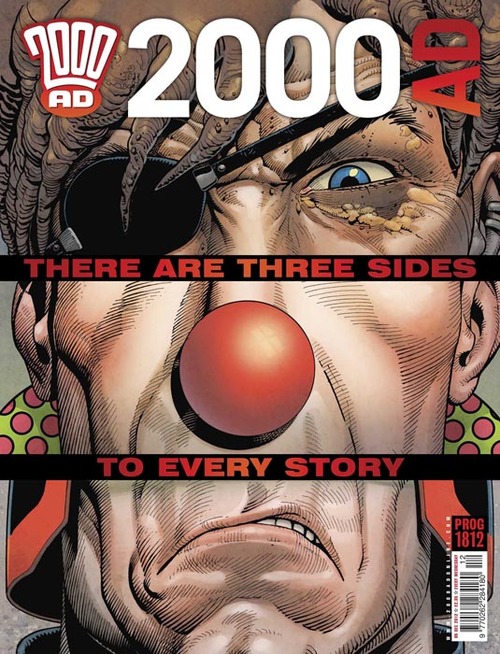
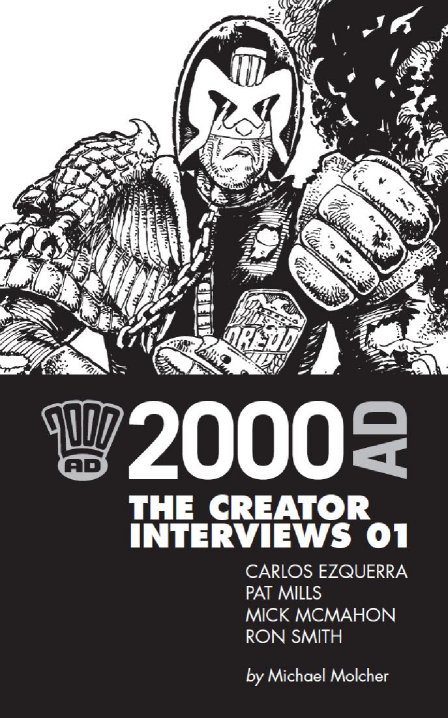
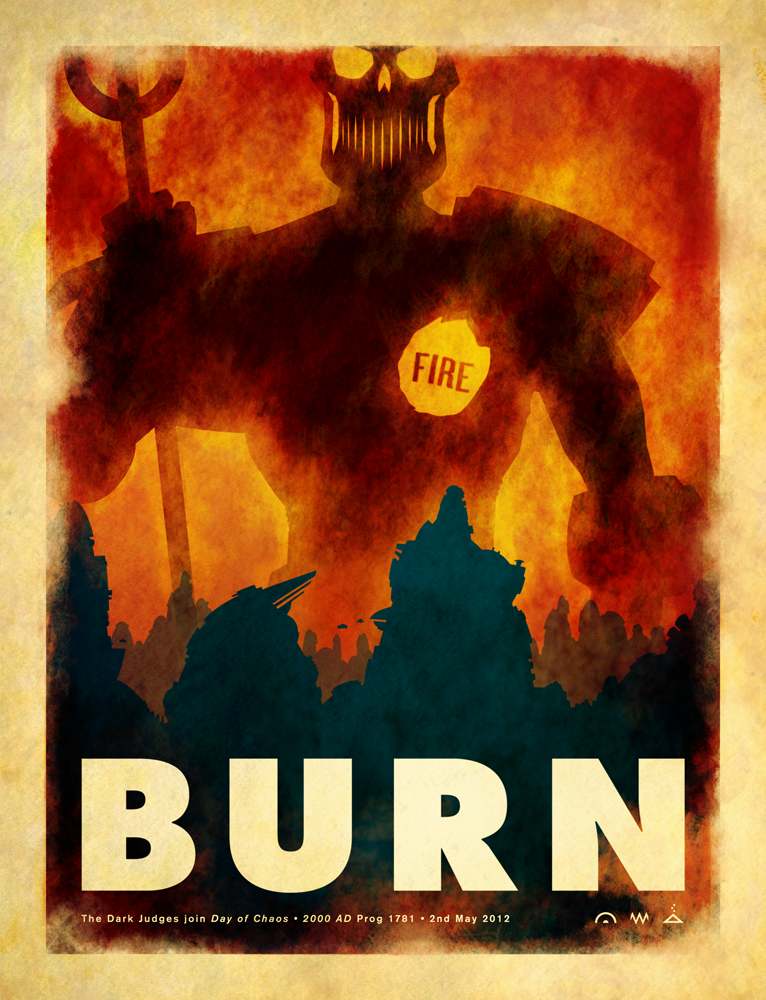
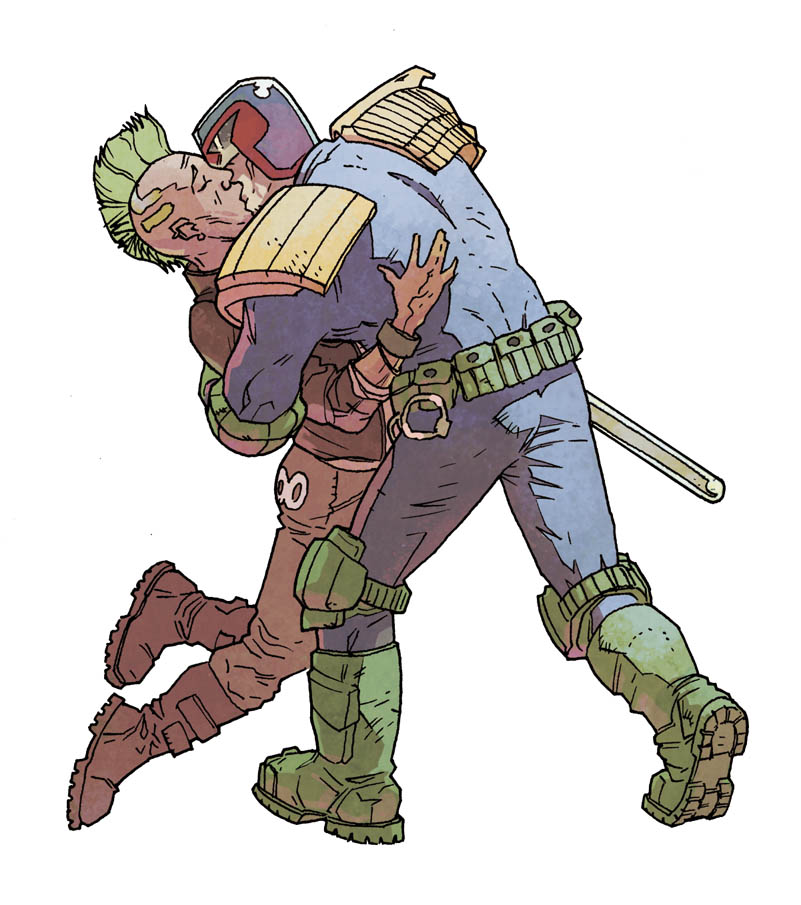
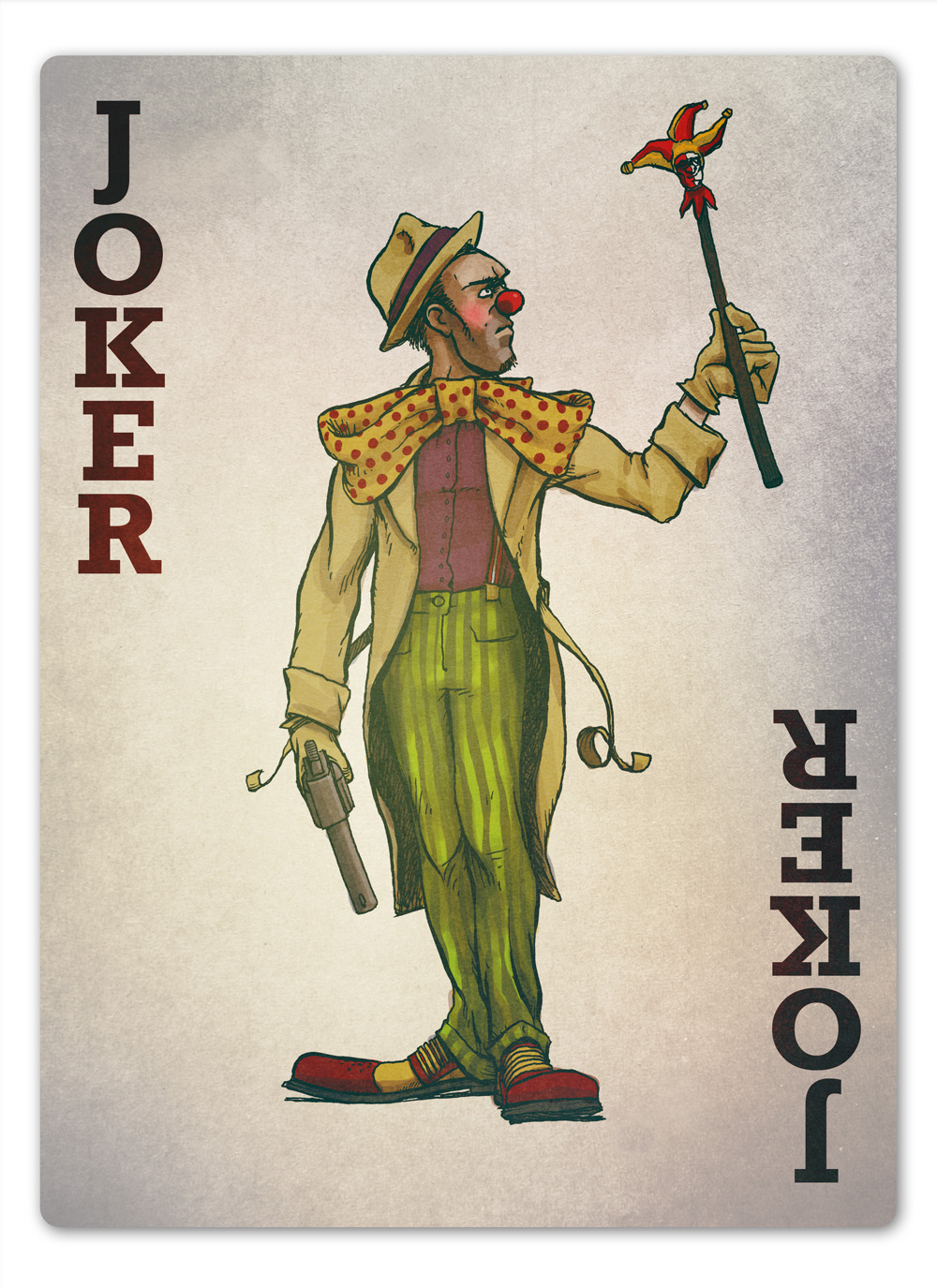
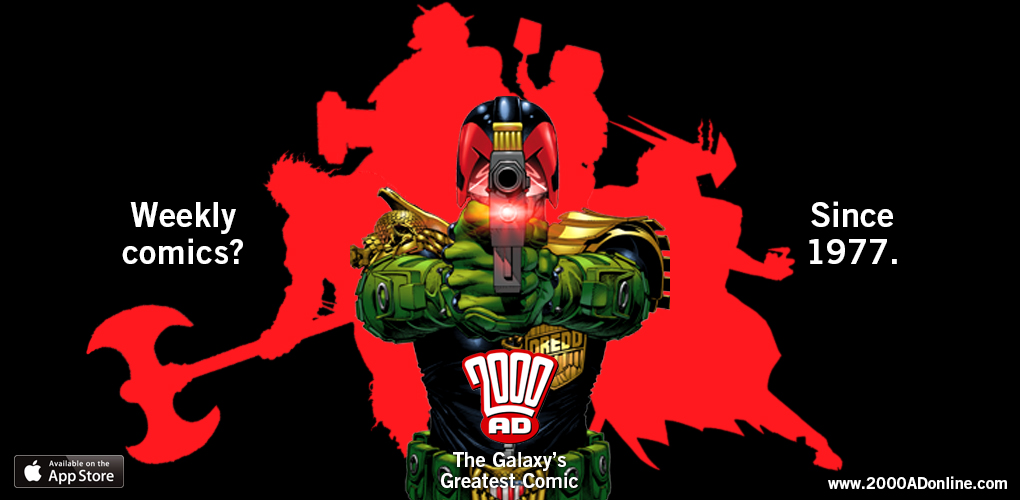

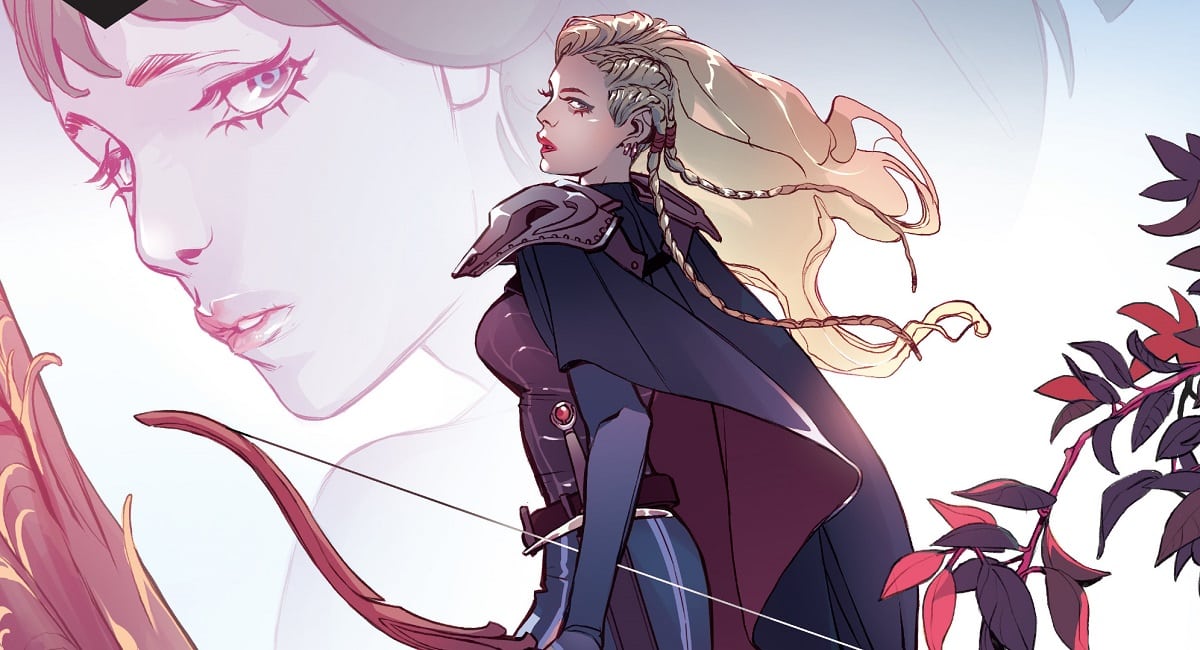
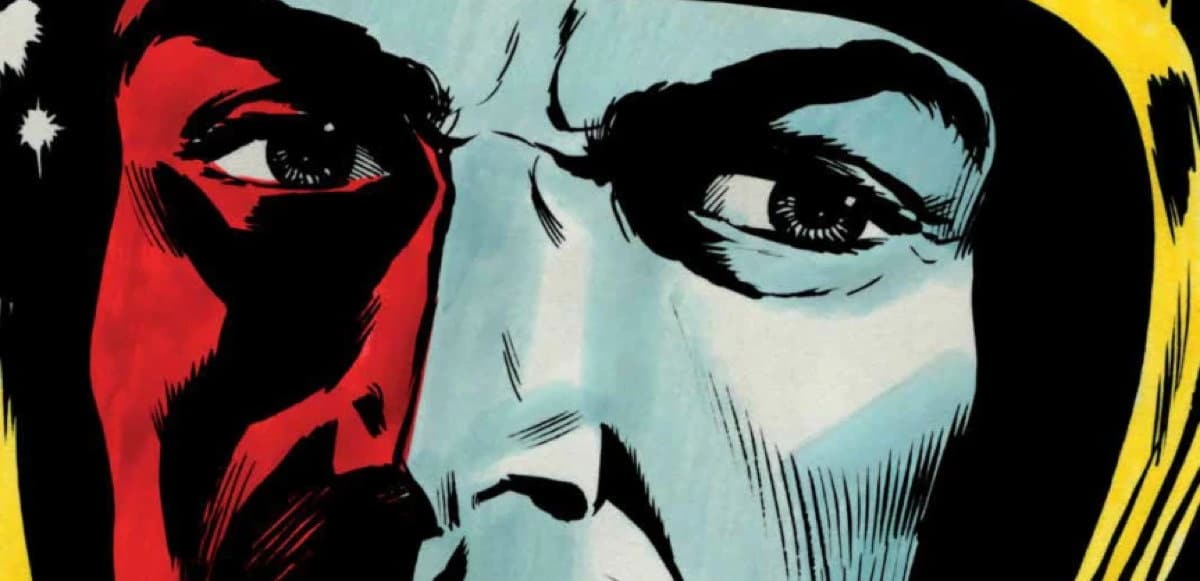



Great interview! I’m really pleased the good PR is turning into sales for 2000 AD. I’ll need to look through some catalogues to cultivate some order lists actually…
Molcher wants to be thicker? Is that possible? ..wait maybe I misread…
Comments are closed.